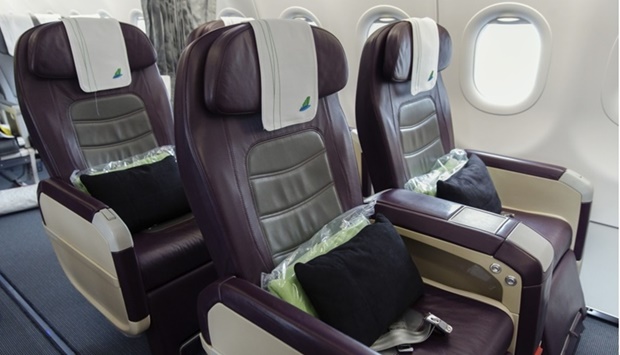| Beyond the Tarmac |
Business travellers make up nearly 12% of airline passengers, but they pay higher rates than other customers and are typically twice as lucrative, accounting for as much as 75% of airline profits.
Also, they tend to buy more expensive seats and last-minute tickets, and are typically twice as profitable as other passengers.
In fact, on some flights, business passengers represent 75% of an airline's revenues, according to financial website Investopedia.
This phenomenon has obviously changed in light of the Covid-19 pandemic, as overall airline traffic was decimated in the second and third quarters of 2020.
Corporate clients mostly buying premium seats typically deliver bigger returns than those packed in economy class, spending more than $1tn on travel in 2019, according to the World Travel & Tourism Council.
With the proliferation of virtual meetings and most corporate employees working remotely, business travel, in particular, has been sharply curtailed since 2020.
Hence, the return of business travellers will be key to reviving the airlines.
Latest data indicate business travel may stage a comeback after stagnating for more than two years following a collapse during the early days of the coronavirus pandemic.
Global business travel is expected to surge 38% in 2022 over the previous year, according to the Business Travel Index by the Global Business Travel Association.
It said business travel activity in 2021 started to rebound “from the sharp downturn brought about by the Covid-19 pandemic,” after having seen a decline of 53.8% in 2020. In 2021 it was expected to rebound 14% – from $661bn in 2020 to $754bn in 2021. Full recovery isn’t expected until 2024, a year earlier than previously expected.
“Despite recovery setbacks in 2021, a year-over-year surge of 38% is expected in 2022 as recovery and pent-up demand kicks into a higher gear, bringing global business travel spending back to over $1tn,” the report said.
“People are looking to get out and not only gather with their own colleagues, but they’re also looking to get out and meet with customers,” Stephen Squeri, American Express (Amex) chief executive said.
“People are excited to go out and see the world again, both from a business perspective and from a consumer perspective,” he said.
Travel spending by S&P 500 clients in March was “well over 50%” of its level in 2019, the year before the pandemic hit, Amex chief financial officer Jeff Campbell told The Financial Times.
While it remains to be seen whether the recovery can be sustained — executives may ultimately take fewer business trips than previously once the initial euphoria of a return to travel wears off — the pace of the rebound is shoring up confidence at airlines as they deploy fleets and map out their post-pandemic networks.
The Bloomberg World Airlines Index has climbed about 50% from a May 2020 low. Delta Air Lines Inc says domestic business bookings have reached 70% of 2019’s level, and almost all its corporate clients expect to travel more in the current quarter. United Airlines Holdings says business travel across the Atlantic already exceeds what it saw in 2019.
“I think this quarter we’ll be able to put to bed the whole question: ‘Is business travel coming back?” United chief executive officer Scott Kirby told Bloomberg Television.
“That business travel is recovering so rapidly makes us feel really, really confident.”
But the picture isn’t uniform, according to Bloomberg. The rebound is anaemic in China, which is still locking down entire cities in a bid to stamp out Covid, and Hong Kong, where foreign visitors must quarantine on arrival.
And many of those filling the most expensive seats are leisure travellers who have made their way to the front of the plane with loyalty points in pursuit of additional distance from fellow passengers — or perhaps just a bit of pampering after being grounded by pandemic restrictions; it’s unclear whether this will continue once they settle into normal travel routines.
Although online booking service Hotel Planner predicts it will take an additional two years for business travel to fully recover, many executives are making up for lost time.
A majority of companies responding to an April survey by the Global Business Travel Association say they are putting executives back on planes as staff return to the office, and trips are being cancelled less frequently.
That said, a 2022 travel outlook report concluded that corporate travel this year is unlikely to reach or be near the 2019 levels even assuming the best possible Covid-19 outcomes.
And company executives “will likely continue to closely scrutinise travel spend and return on investment after operating successfully with so few trips,” the report said.
The year started with a surge in Omicron cases around the world, which clearly slowed down the global travel industry.
However, the pandemic situation has improved considerably in most major markets over the last two months.
The combination of open borders, eased restrictions and a return to workplaces has given businesses and consumers a much-needed boost in confidence to travel.
Industry analysts say business travel is expected to accelerate this year, driven by an increase in events and meetings around the globe.
After all, there is something special about meeting face-to-face!
Pratap John is Business Editor at Gulf Times. Twitter handle: @PratapJohn


